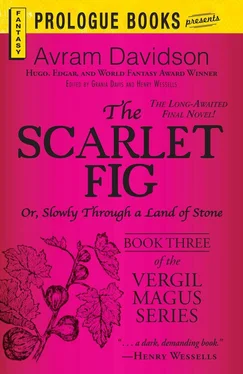Vergil dozed, slumbered, awoke, tossed as the ship, tossed, slumbered, awoke, and finally fell into a state in which wakefulness and doze and daze and sleep and fretful confusion were all alike mixed. All jests about sea-sickness fell into the abyss. He was wounded with a mortal wound and the first sickening shock thereof continued, shocking and sickening, without abatement. Whither did the vessel go? This was no offshore sea, rolling merely restlessly between Negroponte and the Grecian main, or between Italy and Corsica, or off the lands of the Ligurians. Something was deeply different and deeply wrong: this sea had neither bottom nor shores! He strove to leave his body and go soaring aloft to spy out where they might be and then inform and guide the sea-men of the ship; but the waves, the winds, the spume and spray, beat him back, beat him back, beat him down: and thus he continued and abode long a while.
He awoke into a different world. To his starboard spread a quiet sea; quiet but not at all sluggish like the waters of the Putrid Sea adjacent to the Paleus Maeotis and whose size — their sizes — remained a mystery: a light wind stirred the waters as it stirred his hair.
The noises of the ship — the creaking of the planks and timbers, the rattling of the ropes, the luffing of the sails — all still continued, but not loudly nor frantically. To his larboard stretched the land: now tawny, now green, trees dotted the coast and hills, and along the edge of it were white and yellow sands. The sunlight there was different: the sunlight, fractured, shattered, was reflected from a million shattered crystals (themselves not seen); the sunlight was reflected by the facets of a spadai æon of atoms; and these reflections sparkled without dazzling: unstinted … untainted … and untorn. The captain, Plauto, greeted him, in rather an abstract manner.
“What shore?” asked Vergil. “What coast of people?”
Plauto opened his mouth, closed it, shrugged. “Well, ser. It is the old story. We have been carried off our course by storm. We had intended to make for the Islands,” a slight emphasis here, “… our usual way … then to come back into the Mainland by a southwest route,” his arms and hands described a rough triangle — from the Mainland to the Islands (whichever islands they were), from the Islands to the Mainland — it was a large enough triangle, and, had it been completed, would have saved the ship from hugging quite a section of the coast. As for trading opportunities missed along that section, this, as it occurred to Vergil, must have occurred to Plauto as well. However. There was perhaps therewith those Islands which had so much made visiting them worth the while that Plauto had never ceased to do so, even though it meant that, season after season, venture after venture, never once in his life did he forbear to do so; recking nothing of the neglected possibilities of the mute commerce and the trading post, into which that curious marketing so oft developed.
“… and to speak the truth —”
“As is your invariable way of speaking,” Vergil said, gravely. He could hardly overlook this opportunity of sticking the long needle in, of reminding Plauto, now more-or-less his friend, of that trick and decept by which he had lured Vergil aboard his scummy bark in the first place; easily lying about his course and destination in order to get the stranger’s passage-fee. But Plauto, either expecting no sarcasm or accepting this description of himself — certainly the way in which he would wish to be seen — as accurate, Plauto nodded. “— to speak the truth, Ser Doctor, I don’t know this coast and shore at all. And though we shall soon need water …” Plauto did not continue the sentence. He did not need to; its implications were obvious. And — head for a green section, as likely to have water (else why and how was it green?), why … bless you … the water was as likely to flow underground as not. And Plauto and his men were not tap-roots.
Vergil scanned the coast. Then he nodded. Gestured. “That blink of white? That will be the rock called The Skull. Just past it will be a small cove, and at the head of the cove a small trickle of water. Very small. And very slow. Not enough to fill the butts. But enough to give us a drink. All of us. And then …” He paused to intensify the effect. “And then … after half a day’s sail, we come to the region called Huldah.”
Plauto’s face quickened. His face showed more nor one emotion. “Ah, ser! And here I thought that you were an entire stranger to these lands! The Skull! The region called Huldah! I have heard of them! My thanks, Ser Doctor! My thanks —” Here he seemed just a bit troubled, literally swept the look off his face with his hand, called out something to the crew. Vergil saw the helmsman’s arms and shoulders move. Presently the ship was seen to stand down the vast bay and proceed more closely along the shore.
VI
The Region Called Huldah
We should sight it, then, after that headland there,” Plauto had said, meaning The Region Called Huldah. And Vergil had nodded.
But when they rounded “that headland, there,” they did not sight it … or anything else. Whatever lay beyond was shrouded from them, from sea to sky, as if by a series of pleated white gauze screens and curtains, seemingly one behind another, such as often veiled the throne and person of some exotic Berbar queen in her native court. Vergil looked quizzically at Plauto. And that one rubbed the bridge of his sun-scorched nose, and then slowly shook his puzzled head. Said, “I don’t know what to make of this. Never seen anything exactly like it. Smoke? It don’t look like smoke. And neither can we smell it. Mist? It don’t look like mist, either. It’s not the weather for fog. Nor it’s not the time of year for haze … besides which, it’s not the color as haze would be. But one thing about it as I can tell you —”
And Vergil waited, and then gave some slight questioning sound.
“— I can tell you, my ser, that we are not going to try to hug a shore which we can’t see. Rocks, reefs, shoals, shallows … who can know what might lie there? Eh? Doctor? What do you say?”
Vergil said that he thought he’d like to make a fire. “Right here where I now stand.” Plauto called something. As a crewman appeared with the thin skin of hammered-flat iron and the box of sand on which the few cook-fires were built (lest the direct heats of the fire should infect the wooden surface of the ship), Vergil busied himself with items from his old doe-skin budget. He accepted the few pieces of charcoal which the crewmen next offered him, and to this he added some black shards of his own; bringing samples which he had taken with him when in Naples: not that he had much needed them just then or expected to need them on this or any voyage, but merely that in his haste he had not taken them out of the pack again. Miraculously and somehow, a living coal had been saved afire throughout all the commotions of the storm; Vergil declined it with great politeness. Neither did he accept the offer of Plauto’s tinder-box, its scorched linen, and its flint and steel. Carefully he arranged the charcoal, as though might some grave bird engaged in nidification as the time of the laying of the eggs drew nigh. He bowed his head. The men, assuming he was engaged in prayer, grew silent. In his innermost mind he bethought himself once again in the Sunken School abaft the Fuel Market in Sidon.
And gradually a piece of charcoal reddened.
He had no hollow tube, but, placing his head quite near, himself his own “blower of fire,” he let his warm breath play about the heap. And then all the charcoal was alight.
Next he added a few leaves of sage, and some shaved root of zinziber, the “ginger” of his uneasy recent dream, and one drop only of Olor of Benjamin (benjoin, some called it). Atop this all he placed a sole feather of the swallow, which, released from the wicker cage never so far at sea, would always — wise bird! inerrably head for land, so that a keen-eyed master of a ship might follow o’er the white-waved seas , as the sweet singer of Anglia had put it. And then he fanned with the fan which Plauto had waiting; woven, it was of palm leaves: be there even so much as a single tree upon this hidden shore, likely it would be a palm. And like called, even silently, to like.
Читать дальше











